Ethel Clayton
Ethel Clayton (November 8, 1882 – June 6, 1966) was an American actress of the silent film era.
Ethel Clayton | |
|---|---|
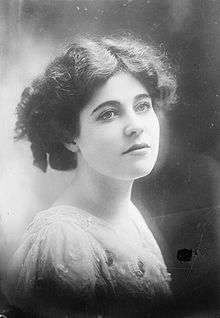 Clayton in 1910 | |
| Born | November 8, 1882 Champaign, Illinois, U.S. |
| Died | June 6, 1966 (aged 83) Oxnard, California, U.S. |
| Occupation | Actress |
| Years active | 1909–1948 |
| Spouse(s) | Joseph Kaufman (m. 19??; died 1918) |
Early years
Born in Champaign, Illinois, Clayton attended St. Elizabeth's school in Chicago.[1]
Career
Clayton debuted on stage as a professional as a member of the chorus in a production at the Chicago Opera House. After that, she worked with stock theater companies in Milwaukee and Minneapolis.[1]
On stage, Clayton appeared mainly in musicals or musical revues such as The Ziegfeld Follies of 1911. In addition to that production, her Broadway credits include Fancy Free (1918), You're in Love (1917), Nobody Home (1915), The Red Canary (1914), The Brute (1912), and His Name on the Door (1909).[2]
Clayton's first film was When the Earth Trembled.[1] Following appearances on screen in short dramas from 1909 to 1912, she made her feature-length film debut in For the Love of a Girl in 1912. Barry O'Neil directed the film, and Clayton later was directed by William Demille, Robert G. Vignola, George Melford and Donald Crisp in subsequent feature films. Like many silent film actors, Clayton's career was hurt by the coming of sound to motion pictures. She continued her career in small parts in films until she retired in 1948. Her screen credits number more than 180.
Personal life
In 1931, Clayton obtained a California Superior Court order enjoining her former business partner, W.L. Rucker, from disposing of 316 pearls. Clayton and Rucker agreed to purchase a cosmetics business and the pearls had been entrusted to Rucker to raise money. The deal fell through and he refused to return the jewels. Rucker admitted to possessing the pearls but claimed they had been pledged as security for a $125 loan. The pearls were valued at $20,000.
Marriages
Clayton was first married to actor-director Joseph Kaufman until his death in 1918 in the Spanish flu epidemic. She later married silent film actor and former star Ian Keith twice and they divorced twice. In both cases Clayton cited cruelty and excessive drinking. Clayton and Keith were first married in Minneapolis in 1928 and first separated on January 13, 1931.
Death
Ethel Clayton died on June 6, 1966 at Guardian Convalescent Hospital[3] in Oxnard, California, aged 83. She was buried at Ivy Lawn Memorial Park in Ventura, California.
For her contributions to the motion picture industry, Ethel Clayton has a star on the Hollywood Walk of Fame at 6936 Hollywood Boulevard.[4]
Selected filmography
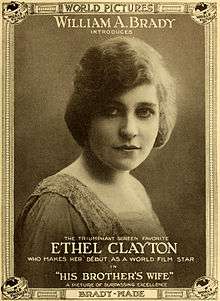
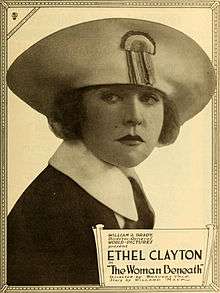
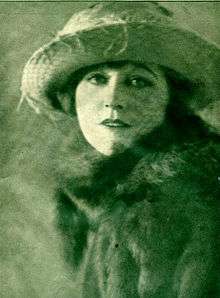
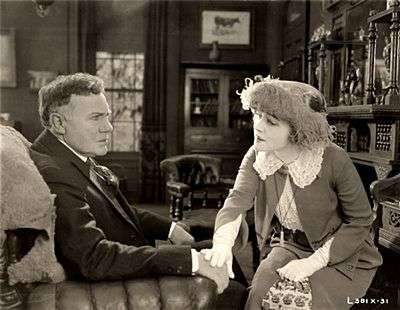
1909 to 1914
- Justified (1909) (*short)
- Gratitude (1909) (*short)
- The Brothers (1909) (*short)
- The Twelfth Juror (1909) (*short)
- The Tout's Remembrance (1910)(*short)
- For the Love of a Girl (1912) (*short)
- A Romance of the Coast (1912) (*short)
- The Doctor's Debt (1912)
- The Last Rose of Summer (1912) (*short)
- Just Maine Folk (1912)
- An Irish Girl's Love (*short)
- The Wonderful One-Horse Shay (1912)
- The Price Demanded (1913)
- When the Earth Trembled (1913) Extant; restored 2015 by EyeMuseum, Netherlands
- The Lion and the Mouse (1914)
- The House Next Door (1914)
- The Fortune Hunter - (1955)
1915
- The Attorney for the Defense (*short)
- The Furnace Man (*short)
- His Soul Mate (*short)
- It All Depends (*short)
- The Millinery Man (*short)
- A Woman Went Forth (*short)
- Margie Puts One Over (*short)
- Here Comes the Bride (*short)
- The Blessed Miracle (*short)
- Monkey Business (*short)
- The Unmarried Husband (*short)
- Capturing the Cook (*short)
- Just Look at Jake (*short)
- The College Widow (*5-6 reels) - Lost
- In the Dark (*short)
- The Sporting Duchess (*short)
- The Darkness Before Dawn (*short)
- Money! Money! Money! (*short)
- When the Light Came In (*short)
- The Earl's Adventure (*short)
- A Day of Havoc (*short)
- The Deception (*short)
- It Was to Be (*short)
- The Mirror (*short)
- In Spite of Him (*short)
- The Orgy (*short)
- The Great Divide (*5 reels)
1916
- Ophelia (*short, she appears in one more short in 1926)
- Dollars and the Woman
- His Brother's Wife
- A Woman's Way
- Husband and Wife
- The Hidden Scar
- Beyond the Wall
- The New South
- Dollars and the Woman
1917
- The Woman Beneath
- The Bondage of Fear
- The Web of Desire
- Man's Woman
- Yankee Pluck
- The Stolen Paradise (incomplete; Library of Congress)
- Souls Adrift
- The Dormant Power (*Extant; Filmmuseum Nederlands (EYE) ..)
- Easy Money
1918
- Stolen Hours(*extant: LoC, Natl. Archives of Canada)
- The Whims of Society
- The Witch Woman (*incomplete; LoC)
- Journey's End
- The Man Hunt
- The Girl Who Came Back
- A Soul Without Windows
- Women's Weapons
- The Mystery Girl
1919
1920
- The Thirteenth Commandment
- Young Mrs. Winthrop
- A Lady in Love
- The Ladder of Lies
- Crooked Streets (Survives; Library of Congress)
- A City Sparrow
- The Sins of Rosanne (Survives; Library of Congress)
1921
- The Price of Possession
- Sham
- Wealth
- Beyond (Survives; Library of Congress)
- Exit the Vamp
1922
- Her Own Money
- The Cradle (*extant; LoC)
- For the Defense
- If I Were Queen
1923
- Can a Woman Love Twice?
- The Remittance Woman
1925
- The Mansion of Aching Hearts
- Wings of Youth - Lost
- Lightnin' - Survives
1926
- The Bar-C Mystery - Lost
- The Merry Widower (*short, last short of her career) - Survives
- Sunny Side Up - Survives
- Risky Business - Survives
- His New York Wife
1927
- The Princess from Hoboken (1927) Lost
- The Princess on Broadway (1927) Lost
1928 to 1947
- Mother Machree (1928)- Incomplete
- Hit the Deck (1930) sound debut
- The Crooked Circle (1932)
- The All American (1932)
- Secrets (1933)
- The Whispering Shadow (1933)
- Let's Fall in Love (1933)
- Easy to Take (1936)
- Rich Relations (1937)
- Souls at Sea (1937)
- The Big Broadcast of 1938 (1938)
- You and Me (1938)
- The Sap Takes a Wrap (1939)
- New York Town (1941)
- Beyond the Blue Horizon (1942)
- Dixie (1943)
- Henry Aldrich's Little Secret (1944)
- The Blue Dahlia (1946)
- The Perils of Pauline (1947)
See also
References
- >Lowrey, Carolyn (1920). The First One Hundred Noted Men and Women of the Screen. Moffat, Yard. p. 34. Retrieved January 25, 2020.
- "Ethel Clayton". Internet Broadway Database. The Broadway League. Archived from the original on May 25, 2018. Retrieved January 25, 2020.
- Oxnard Press Courier. June 6, 1966. Missing or empty
|title=(help) - "Ethel Clayton". Hollywood Walk of Fame. Archived from the original on August 14, 2020. Retrieved August 14, 2020.
- The New York Times, "Sues For 316 Pearls", March 26, 1931, Page 56.
- The New York Times, "Decree To Ethel Clayton", February 27, 1932, Page 20.
- The New York Times, "Film Couple Re-Divorced", July 20, 1932, Page 20.
- The New York Times, "Ethel Clayton", June 12, 1966, Page 86.
External links
| Wikimedia Commons has media related to Ethel Clayton. |
- Ethel Clayton at the Internet Broadway Database

- Ethel Clayton on IMDb
- Ethel Clayton at Virtual History
- Ethel Clayton: Broadway Photographs (Univ. of South Carolina)(Wayback)
- portrait gallery(Univ. of Washington, Sayre collection)